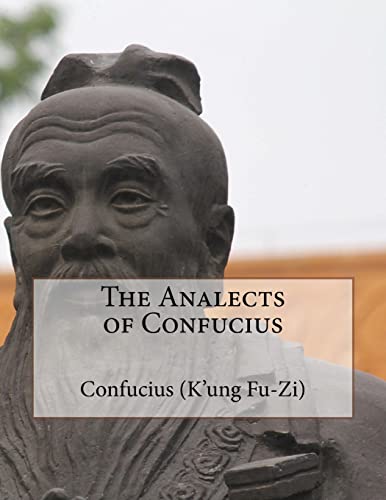Articoli correlati a The Analects of Confucius

Sinossi
The Analects also known as the Analects of Confucius, is a collection of sayings and ideas attributed to the Chinese philosopher Confucius and his contemporaries, traditionally believed to have been written by Confucius' followers. It is believed to have been written during the Warring States period (475 BC–221 BC), and it achieved its final form during the mid-Han dynasty (206 BC–220 AD). By the early Han dynasty the Analects was considered merely a "commentary" on the Five Classics, but the status of the Analects grew to be one of the central texts of Confucianism by the end of that dynasty. During the late Song dynasty (960-1279) the importance of the Analects as a philosophy work was raised above that of the older Five Classics, and it was recognized as one of the "Four Books". The Analects has been one of the most widely read and studied books in China for the last 2,000 years, and continues to have a substantial influence on Chinese and East Asian thought and values today. They were very important for Confucianism and China's overall morals.Confucius believed that the welfare of a country depended on the moral cultivation of its people, beginning from the nation's leadership. He believed that individuals could begin to cultivate an all-encompassing sense of virtue through ren, and that the most basic step to cultivating ren was devotion to one's parents and older siblings. He taught that one's individual desires do not need to be suppressed, but that people should be educated to reconcile their desires via rituals and forms of propriety, through which people could demonstrate their respect for others and their responsible roles in society. He taught that a ruler's sense of virtue was his primary prerequisite for leadership. His primary goal in educating his students was to produce ethically well-cultivated men who would carry themselves with gravity, speak correctly, and demonstrate consummate integrity in all things.
Le informazioni nella sezione "Riassunto" possono far riferimento a edizioni diverse di questo titolo.
- EditoreCreateSpace Independent Publishing Platform
- Data di pubblicazione2016
- ISBN 10 1534761438
- ISBN 13 9781534761438
- RilegaturaCopertina flessibile
- LinguaInglese
- Numero di pagine82
- RedattoreGouveia Andrea
- Contatto del produttorenon disponibile
EUR 17,56 per la spedizione da U.S.A. a Italia
Destinazione, tempi e costiCompra nuovo
Visualizza questo articoloEUR 7,40 per la spedizione da Regno Unito a Italia
Destinazione, tempi e costiRisultati della ricerca per The Analects of Confucius
The Analects of Confucius
Da: THE SAINT BOOKSTORE, Southport, Regno Unito
Paperback / softback. Condizione: New. This item is printed on demand. New copy - Usually dispatched within 5-9 working days 218. Codice articolo C9781534761438
Quantità: Più di 20 disponibili
Analects of Confucius
Da: GreatBookPrices, Columbia, MD, U.S.A.
Condizione: As New. Unread book in perfect condition. Codice articolo 27108749
Quantità: Più di 20 disponibili
Analects of Confucius
Da: GreatBookPrices, Columbia, MD, U.S.A.
Condizione: New. Codice articolo 27108749-n
Quantità: Più di 20 disponibili
Analects of Confucius
Da: GreatBookPricesUK, Woodford Green, Regno Unito
Condizione: As New. Unread book in perfect condition. Codice articolo 27108749
Quantità: Più di 20 disponibili
Analects of Confucius
Da: GreatBookPricesUK, Woodford Green, Regno Unito
Condizione: New. Codice articolo 27108749-n
Quantità: Più di 20 disponibili
The Analects of Confucius (Paperback)
Da: CitiRetail, Stevenage, Regno Unito
Paperback. Condizione: new. Paperback. The Analects also known as the Analects of Confucius, is a collection of sayings and ideas attributed to the Chinese philosopher Confucius and his contemporaries, traditionally believed to have been written by Confucius' followers. It is believed to have been written during the Warring States period (475 BC-221 BC), and it achieved its final form during the mid-Han dynasty (206 BC-220 AD). By the early Han dynasty the Analects was considered merely a "commentary" on the Five Classics, but the status of the Analects grew to be one of the central texts of Confucianism by the end of that dynasty. During the late Song dynasty (960-1279) the importance of the Analects as a philosophy work was raised above that of the older Five Classics, and it was recognized as one of the "Four Books". The Analects has been one of the most widely read and studied books in China for the last 2,000 years, and continues to have a substantial influence on Chinese and East Asian thought and values today. They were very important for Confucianism and China's overall morals.Confucius believed that the welfare of a country depended on the moral cultivation of its people, beginning from the nation's leadership. He believed that individuals could begin to cultivate an all-encompassing sense of virtue through ren, and that the most basic step to cultivating ren was devotion to one's parents and older siblings. He taught that one's individual desires do not need to be suppressed, but that people should be educated to reconcile their desires via rituals and forms of propriety, through which people could demonstrate their respect for others and their responsible roles in society. He taught that a ruler's sense of virtue was his primary prerequisite for leadership. His primary goal in educating his students was to produce ethically well-cultivated men who would carry themselves with gravity, speak correctly, and demonstrate consummate integrity in all things. Shipping may be from our UK warehouse or from our Australian or US warehouses, depending on stock availability. Codice articolo 9781534761438
Quantità: 1 disponibili
The Analects of Confucius
Da: Lucky's Textbooks, Dallas, TX, U.S.A.
Condizione: New. Codice articolo ABLIING23Mar2811580009703
Quantità: Più di 20 disponibili

